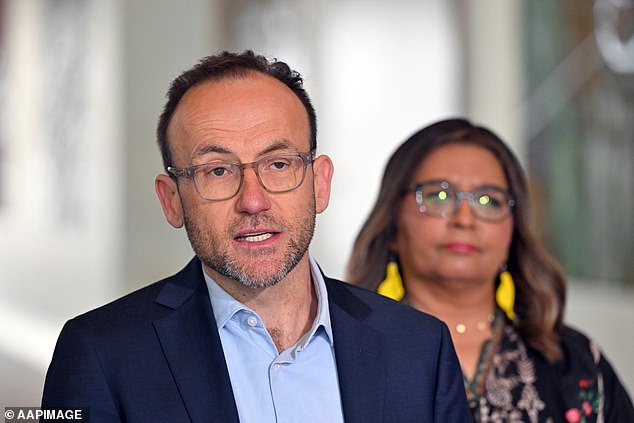Anthony Albanese’s superannuation changes are hit with huge setback – and it’s going to make things very confusing for retirees
Anthony Albanese’s plan to double taxes on super balances above $3 million has suffered a major blow as the Greens refused to pass it on the last day of parliament for the year.
The Greens, whose support Labor needs in the Senate to get legislation passed, continue to block Labour’s Better Targeted Superannuation Concessions and Other Measures Bill 2023.
This is despite leader Adam Bandt on Thursday listing 10 other Labor items linked to the economic policies it would adopt – including Reserve Bank reforms.
The failure to pass this controversial pension bill could mean the policy is dead if Labor fails to win the next election in May, or if the Senate continues to obstruct legislation early next year before parliament is dissolved.
Labor had hoped to end the year with a plan to punish the top 0.5 percent, or 80,000 pension savers, with a new 30 percent tax on nest egg spending over $3 million from July 2025.
This would be double the usual super contribution tax rate of 15 percent.
But the Greens are opposed because they want the threshold lowered to $1.9 million so that 104,141 people, or 0.6 percent of the population, can be covered.
Labour’s super policy also includes a plan to tax unrealized profits above $3 million.
Anthony Albanese’s plan to double taxes on super balances above $3 million has been dealt a major blow as the Greens refused to pass it on the last day of parliament for the year (he is pictured right with fiancée Jodie Haydon)
This would see self-managed super funds taxed on assets yet to be sold.
That’s a radical break from the usual practice of capital gains tax, where assets are taxed after they are sold and their value is realized.
The bill creates uncertainty for self-managed super funds that own property and farms because Labor’s proposed bill would require a valuation of assets above a $3 million threshold.
No other country in the world has taxed unrealized gains on pensions, while countries like Sweden only apply this approach to total wealth.
The Coalition opposes Labour’s super policy, while Blue Green crossbenchers Allegra Spender, Kylea Tink and David Pocock have raised concerns about taxing unrealized profits.
The SMSF Association, which represents self-managed super funds, was relieved that Labour’s super bill had stalled, with chief executive Peter Burgess lobbying against taxing unrealized profits – known as tax division 296.
“What ultimately became clear, to me at least, is that it is highly unlikely that this tax will be passed in the current sitting week and, assuming the elections are not called in advance, its introduction during the scheduled February session 2025. days also seems unlikely,” he said.
“Suggestions that the bill could be passed during the February 2025 Senate sittings appear to run counter to the significant reservations expressed by the crossbench.

The Greens, whose support Labor needs in the Senate to get legislation passed, have yet to back Labor’s better-targeted pension concessions and other measures. Bill 2023 (pictured is leader Adam Bandt with his deputy Mehreen Faruqi)
“The concerns about the design of this tax appear insurmountable without a substantial revision of the bill.”
Shadow Treasurer Angus Taylor has also rejected the bill for focusing only on accrued pensions but ignoring defined benefits.
This would exempt members of parliament elected before October 2004, including Prime Minister Anthony Albanese and opposition leader Peter Dutton, who would be entitled to a guaranteed lump sum based on their time in parliament.
“This regime presents a different approach to a farmer or small business owner than a civil servant, a judge or a politician,” Taylor told Daily Mail Australia.
“Those like the Prime Minister, who are fortunate enough to have a defined benefit plan, will enjoy deferred payments and tax rates determined entirely by regulation, not legislation.
‘This is a wealth tax, very simple. But the Prime Minister has exonerated himself.”
But a Treasury document explained that the bill would in fact target defined benefit pension schemes.
“It is the government’s intention to ensure broadly proportionate treatment of interests in respect of certain benefits,” the report said.
‘The Ministry of Finance will further consult on the correct treatment of interests based on fixed benefits.’
Treasurer Jim Chalmers and other Labor cabinet ministers have not yet publicly accused the coalition of spreading false information, even though the opposition has since May rejected Labor’s proposed laws to exclude defined benefit supers.
The opposition first raised the issue six months ago in a dissenting report to a Senate economics committee charged with examining Labour’s super bill.
